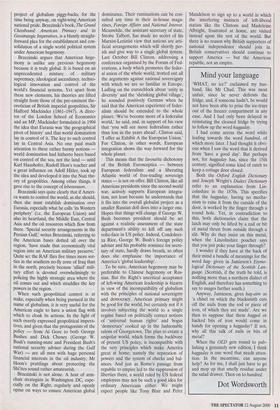Mind your language
'WHAT, no ice?' exclaimed my hus- band, like Mr Chad. This was most unfair, since he never defrosts the fridge, and, if someone hadn't, he would not have been able to prise the ice-trays out of the freezer compartment in any case. And I had only been delayed in reinstating the cleaned fridge by trying to follow up the word haggaday.
I had come across the word while leafing towards the word hundred, of which more later. I had thought it obvi- ous when I saw the word that it derived from 'have a good day'. But perhaps not, for haxaday has, since the 15th century, signified some kind of catch to keep a cottage door closed.
Both the Oxford English Dictionary and Joseph Wright's Dialect Dictionary refer to an explanation from Lin- colnshire in the 1870s. This specifies that the haggaday, having no mecha- nism to raise it from the outside of the door, is worked by the finger. through a round hole. Yet, in contradiction to this, both dictionaries claim that the latch may only be lifted by a nail or bit of metal thrust from outside through a slit. Why do they insist on this metal, when the Lincolnshire poacher says that you just poke your finger through?
I wonder if they have at the back of their mind a bundle of meanings for the word hag- given in Jamieson's Etymo- logical Dictionary of the Scottish Lan- guage. (Scottish, if the truth be told, is nothing more than a northern dialect of English, and therefore has something to say to usages further south.) Anyway, Jamieson, gives hag-aim as 'a chisel on which the blacksmith cuts off the nails from the rod or piece of iron, of which they are made'. Are we then to suppose that these hugged or hacked bits of iron would come in handy for opening a haggaday? If not, why all this talk of nails or bits of metal?
When the OED gets round to pub- lishing a genuinely new edition, I think haggaday is one word that needs atten- tion. In the meantime, can anyone help? As for me, I shall just have to go and mop up that smelly residue under the salad drawer. Then on to hundred.
Dot Wordsworth


























































 Previous page
Previous page